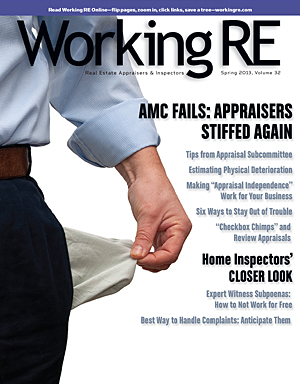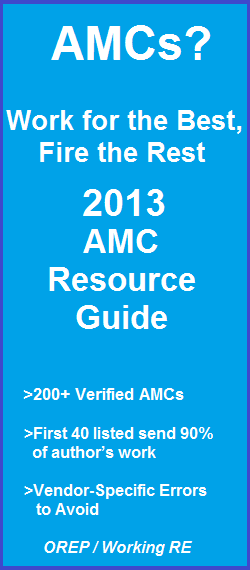
|
Published by OREP, E&O Insurance Experts | June 19, 2013 | Vol. 280 |
If Chase is successful, it means lenders who contract with AMCs for
appraisals, broker price opinions (BPOs) and other services, would have no
financial responsibility to make good on fees owed to end contractors, such as
apprasiers, by bankrupt or otherwise malfeasant AMCs.
Editor's Note:
The bankruptcy earlier this year of the appraisal
management company (AMC) ESA left millions in unpaid fees to appraisers,
agents and brokers, who now are trying to collect from Chase, the bank who
hired the AMC. What happens will have
far-reaching effects on the appraiser-AMC relationship and the industry.
Chase Denies Responsibility for Bankrupt AMC Debt
by Isaac Peck,
Associate Editor
The bankruptcy of
Evaluation Solutions/ES Appraisal Services (ESA) left $11 million in unpaid
debts to its vendors and creditors, with a large portion owed to real estate
appraisers and agents/brokers.
As WRE reported last month, (Stiffed Appraisers Go After Chase), the Florida court overseeing the ESA
bankruptcy is considering granting a Bar
Order that would absolve JPMorgan Chase, the principal client for all
services performed, of all liability for fees due to real estate appraisers,
agents, and brokers who performed millions of dollars of work on Chase loans.
Much hangs in the balance: if Chase is successful, it means lenders who
contract with AMCs for appraisals, broker price opinions (BPOs) and other
services, would have no financial responsibility to make good on fees owed to
the end contractors, such as appraisers, by bankrupt or otherwise malfeasant
AMCs.
(story continues below)

(story continues)
Chase Denies Responsibility
In its legal response to appraisers and agents who
argue that Chase is liable for the unpaid work under federal laws such as
Dodd-Frank, FIRREA, and OCC guidelines, Chase’s lawyers write: “Nothing further in FIRREA, or the Dodd-Frank Act
amendments to FIRREA, the OCC regulations, or USPAP addresses payments to
appraisers.”
Chase also seems to deny that it was the client for
the appraisals and BPOs ordered (Chase is listed as the client on the appraisal
reports), and also seems to question the notion that ESA was their agent.
Chase’s lawyers write: “The appraiser’s client remains the party who, by
employment or contract, engages the appraiser. Otherwise, there is nothing in
federal law governing the payment of appraisers and nothing requiring a
federally-regulated institution such as Chase to backstop or guarantee payment
to appraisers engaged by an independent appraiser management company (“AMC”)
such as Evaluation Solutions, even if that AMC is acting as the regulated
institution’s agent for compliance with FIRREA and its implementing
regulations.”
Chase’s lawyers insist that “Agent is nowhere
defined in the OCC regulations.”
Due to this lack of definition, Chase’s lawyers
define an agency relationship under Florida common law as the following: “An
agency relationship may be established expressly or by estoppel (i.e. an
apparent agency relationship). The standard for determining whether an agency
relationship exists is whether the purported principal has control over the
alleged agent.”
Using this definition of an
agency relationship, Chase’s lawyers appear to deny that an agency relationship
existed between Chase and ESA, even though Chase is listed as the client on all
of the appraisals delivered to Chase and despite the fact that numerous federal
regulations, including FIRREA, require Chase to engage appraisers in one of two
ways only: either directly or through an agent such as an AMC.
The appraisers, agents, and brokers who are seeking
to hold Chase responsible for their unpaid fees insist that Chase is liable
precisely because ESA was their agent, and Chase must be held accountable for
the actions of its agent.
NOLO’s Plain English Law
Dictionary defines agency as:
“The relationship of a person (called the
agent) who acts on behalf of another person, company, or government, known as
the principal. The principal is responsible for the acts of the agent, and the
agent's acts bind the principal.”
(Story continues)
Fighting Back
Sirima Chantalakwong is a BPO Agent in California
whose company, ProValue, Inc., is owed $44,000 for BPOs performed over a
six-month period. She is the
principal claimant in the class action lawsuit filed on behalf of appraisers and
agents/brokers across the country who are left unpaid by ESA.
Having requested to remain anonymous previously,
Chantalakwong, referred to in earlier stories as Shelley Smith, and her husband
Dan (Owner of the Evalonlinecomplaint Facebook page), have been crucial in
organizing the opposition to Chase’s Bar Order and are the ones who initially
hired lawyer Breck Milde, whose law firm appeared in the Florida Bankruptcy
court to oppose the Bar Order.
After the initial hearing in Florida on June 4,
2013, where Milde opposed the Bar Order and urged the bankruptcy judge not to
absolve Chase of its responsibilities to make good on the unpaid fees, both
sides were given additional time to file proposed findings of fact and
conclusions of law.
Counter Suit
In a further development, the Trustee of ESA’s
bankruptcy proceedings has filed a motion seeking sanctions against ProValue,
Inc., arguing that ProValue is in violation of the automatic stay granted to ESA
as terms of the bankruptcy. ProValue
is ordered to appear in court on July 10, 2013 to defend its position. The
Trustee is arguing that ProValue is liable for compensatory and punitive
damages, as well as attorneys’ fees and costs for its attempt to block the Bar
Order and prevent Chase from denying responsibility.
Appraisers,
Agents Urged to Complain to Regulators
Chantalakwong is urging appraisers and agents to
file complaints with Chase’s regulators and let them know about the position
Chase is taking. She encourages
appraisers and agent/brokers to cite the laws in the petition (found below) in
their complaints and to urge regulators to require Chase to take responsibility
for their agent, and enforce the federal regulations that require Chase to
compensate appraisers with a customary and reasonable fee.
The question of whether lenders are responsible if
the AMCs they use fail to pay contractors, such as appraisers, will have
far-reaching and long-lasting effects on the industry, many insiders believe.
Complaint
Form: Chantalakwong says
appraisers and agents/brokers can use the following complaint form to contact
regulators. She recommends using a personalized message and citing relevant laws
(found in the petition):
https://appsec.helpwithmybank.gov/olac_form/
Petition:
Chantalakwong says appraisers and agents/brokers can use the following petition
to ask Chase to take responsibility for their agent:
http://www.change.org/petitions/jpmorgan-chase-take-responsibility-for-the-unpaid-fees-of-your-agent.
>
Click to Print
this Article
HTML Comment Box is loading comments...
ATTENTION: You are receiving WRE Online News because you opted in at WorkingRE.com or purchased E&O insurance from OREP. WRE Online News Edition provides news-oriented content twice a month. The content for WRE Special Offer Editions is provided by paid sponsors. If you no longer wish to receive these emails from Working RE, please use the link found at the bottom of this newsletter to be removed from our mailing list.




